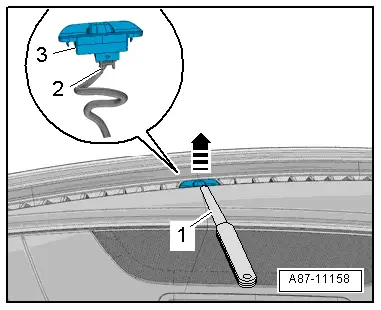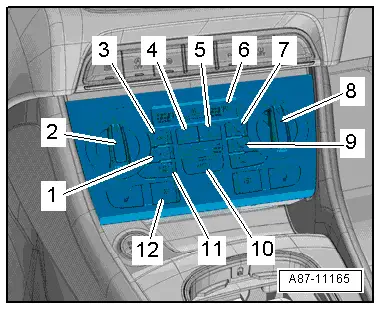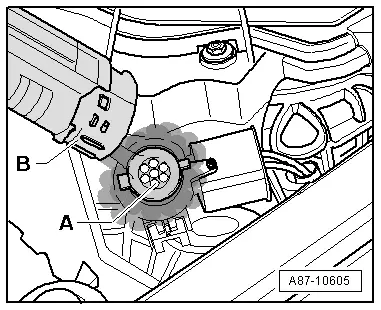Audi Q3: Sunlight Photo Sensor -G107-, Removing and Installing
 Note
Note
- The Sunlight Photo Sensor -G107- is only installed with an automatic climate control system.
- Check the Sunlight Photo Sensor -G107- using the Vehicle Diagnostic Tester in the "Guided Fault Finding" function, A/C system.
Removing
- Using a 0.4 mm feeler gauge -1-, carefully pry the photo sensor -3- out of the top front defroster vent -arrow-
- Disconnect the connector -2-.
Installing
Installation is done is reverse order, observe the following:
After completing the repair work, perform the following operations on the control head using the Vehicle Diagnostic Tester in the "Guided Fault Finding" function:
- Check the DTC memory and delete any currently displayed entries.

Function of Air Quality Sensor -G238-
Function of Air Quality Sensor -G238-
 Note
Note
Only on vehicles with an automatic climate control system
Function mode
- The Air Quality Sensor -G238- requires approximately 30 seconds to reach its operating temperature after the ignition is switched on. During the warm-up phase, the function of the Air Quality Sensor -G238- is limited.
- The Air Quality Sensor -G238- detects pollutants in the surrounding air (usually gasoline and/or diesel exhaust) and causes the Climatronic Control Module -J255- to switch the Air Conditioning (A/C) system to recirculating air mode.
- The Climatronic Control Module -J255- control head recognizes by the signal the type and intensity of the air pollutant on the signal from the Air Quality Sensor -G238-. Based on this information, the Climatronic Control Module -J255- then determines if and when the A/C system switches to recirculating air mode.
Example:
- At an outside temperature above approximately +2 ℃ (36 ºF), the recirculation mode is switched on upon request from theAir Quality Sensor -G238- when there is only a slight increase in the pollutants in the ambient air.
- At an outside temperature between approximately +2 ℃ (36 ºF) and approximately -8 ℃ (18 ºF), the change over to recirculating air mode only occurs at a sharp increase of pollutant concentration, during which the compressor is switched on simultaneously.
- When the exterior temperature is less than approximately -8 ℃ (18 ºF) and the A/C compressor is switched off, the change over only occurs when there is an increase in the pollutant concentration and only then for approximately 15 seconds.
- The indicator lamp in the AC or A/C button does not light up.
- The maximum duration of the "Automatic recirculating air mode" is limited to approximately 15 seconds by the Climatronic Control Module -J255- so that the windows in the vehicle interior do not fog up.
- If the concentration decreases, the A/C system switches to the fresh air mode.
- "Automatic recirculating air mode" can be switched off at any time. If the function is active, the A/C compressor is switched on with a request for "automatic recirculating air mode" and also when the outside air temperature is below +2 ℃ (36 ºF). If the temperature is below -8 ℃ (18 ºF), then it is not possible to use the A/C compressor.
- At the "automatic recirculating air mode" setting on the Climatronic Control Module -J255- A/C control head, the A/C compressor can also be switched on by switching on the recirculating air mode manually (via the recirculation button) up to a temperature of approximately -8 ℃ (18 ºF).
- To ensure that the A/C system does not operate constantly in recirculation mode in areas with a consistently high pollution, the Air Quality Sensor -G238- is self-adapting (it adjusts its sensitivity to the environmental conditions).
- If the outside air pollution load remains relatively high for a long period of time, the Air Quality Sensor -G238- starts to adapt itself to the changing environmental conditions through an adaptation program (learning program) so that the air recirculation request in evenly polluted ambient air is therefore generally shorter than 12 minutes. If a succession of peaks in the polluted air is detected, the A/C system can operate over a longer period of time in recirculating air mode.
- A certain amount of time is required for repositioning of the air conditioning system doors. In the event that a sudden increase in pollutants is encountered (e.g. when driving through a diesel exhaust cloud) gaseous pollutants can be taken in with the fresh air into the passenger compartment until the door can be closed. For this reason, a dust and pollen filter is installed with a charcoal layer. A filter that is saturated with pollutants is no longer effective and needs to be replaced.
- To prevent excessive operation of the fresh air/air recirculation doors, the door is not actuated immediately if there is a nominal increase in pollutants in the surrounding air (the Air Quality Sensor -G238- does not send a request to the Climatronic Control Module -J255-). The filtering of the charcoal insert in the dust and pollen filter will be sufficient.
- In order to avoid frequent operation of the fresh air/air recirculation doors, the request from the Air Quality Sensor -G238- for "Automatic recirculating air mode" remains for at least 25 seconds (minimum duration period), even if the pollutant concentration is so far reduced that recirculating air mode is no longer necessary.
- The Climatronic Control Module -J255- does not allow any air circulation in "defrost" mode so that the window glass can defog as quickly as possible.
- The Air Quality Sensor -G238- requires approximately 30 seconds to become operational once the ignition has been switched on (warm-up time). There is no request sent to the Climatronic Control Module -J255- control head for "Automatic recirculating air mode" at this time.
- The Air Quality Sensor -G238- contains a highly sensitive electronic component which can be damaged if it comes in direct contact with solvents, fuels or chemicals. For this reason, do not install sensors that may have come into contact with these substances.
Air Quality Sensor -G238-, Checking
 Note
Note
Only on vehicles with an automatic climate control system
Special tools and workshop equipment required
- Vehicle Diagnostic Tester
Test Prerequisites
- The vehicle is standing in a clean atmosphere.
- Away from running engines, exhaust vents, etc.
- The engine compartment and the plenum chamber are clean.
- Not contaminated with oil or fuel.
- The engine compartment and the plenum chamber were not sprayed with cleaning agents or preservatives containing solvents
- "Automatic recirculating air mode" is switched on.
Functionality, Checking
- Remove the Air Quality Sensor -G238-. The connector remains connected. Refer to → Chapter "Air Quality Sensor -G238-, Removing and Installing".
Adjust the following settings on the Climatronic Control Module -J255- control head:
- "Auto" mode - the indicator lamp in the AUTO button -10- illuminates.
- "Automatic air recirculation" - the indicator lamp in the recirculation button -11- illuminates.
- After a 30 second warm-up time the Air Quality Sensor -G238- is ready to be used.
- Wait 30 seconds for the Air Quality Sensor -G238- to warm up.
- Check the Diagnostic Trouble Code (DTC) memory for the Climatronic Control Module -J255- control head and select "Read measured values". Refer to Vehicle Diagnostic Tester in the "Guided Fault Finding" function.
- Read the measured values for the Air Quality Sensor -G238-. The Air Quality Sensor -G238- displays the operating condition of the fresh air/air recirculation door and the signal.
- No request for "Recirculating air mode" is present - Air Conditioning (A/C) system in fresh air mode.
or
- No request for "recirculating air mode" present - request for "partial recirculating air mode" present (fresh air/air recirculation door in the center position)

- Read the measured values for the Air Quality Sensor -G238-.
- Specified value: request for "Automatic recirculating air mode" present, request is fulfilled - A/C system switches to recirculating air mode.
- Wait a short period time (approximately one minute, depending on amount of test gas flowing into the sensor).
- Read the measured values for the Air Quality Sensor -G238-.
- Specified value: no request for "Recirculating air mode" present - A/C system in fresh air mode.
or
- Specified value: no request for "automatic recirculating air mode" present - request for partial recirculating air mode present.
 Note
Note
In order to avoid frequent operation of the fresh air/air recirculation doors, the request of the Air Quality Sensor -G238- for "Automatic recirculating air mode" remains for at least 25 seconds (minimum duration period), even if the pollutant concentration is so far reduced that recirculating air mode is no longer necessary.
- Operate the switch for windshield wiper/washer system until the Windshield Washer Pump -V5- has delivered fluid for approximately 2 seconds.
- Read the measured values for the Air Quality Sensor -G238-.
- Specified value: Request for "Recirculating air mode" because of windshield washer system present - A/C system switches for approximately 10 seconds to the air recirculating mode.
- Wait a short period of time.
- Read the measured values for the Air Quality Sensor -G238-.
- Specified value: no request for "Recirculating air mode" present - A/C system in fresh air mode.
or
- Specified value: no request for "automatic recirculating air mode" present - partial recirculating air mode active.
 Note
Note
- Depending on the composition of the windshield washer fluid, the Air Quality Sensor -G238- is able to potentially determine impurities in the air and request for "Automatic recirculating air mode".
- If no changeover to recirculating air mode occurs when operating the switch for the windshield wiper/washer system (the information "wash windshield" is received via the Convenience data bus system from the Steering Column Electronics Control Module -J527-), check the function on the Vehicle Diagnostic Tester in the "Guided Fault Finding" function.
- Install the Air Quality Sensor -G238-. Refer to → Chapter "Air Quality Sensor -G238-, Removing and Installing".
If the function of Air Quality Sensor -G238- is OK for this test and there is a customer complaint, continue as follows:
- Check the dust and pollen filter for soiling. Refer to → Chapter "Dust and Pollen Filter, Removing and Installing".
- Select "Read measured values" using the Vehicle Diagnostic Tester in the "Guided Fault Finding" function.
 Note
Note
A second person is required to read out values displayed while driving.
Observe the safety precautions. Refer to Vehicle Diagnostic Tester in the "Guided Fault Finding" Function.
- Alternately read out the displays in the "read measured values" function for the measured values of the Air Quality Sensor -G238- and the recirculation/fresh air mode request.
- Drive the vehicle into an area with a relatively clean atmosphere.
- Target value: System operates in fresh-air mode.
- Then drive vehicle into an area where the atmosphere is polluted (for example, onto an uphill road with truck traffic).
- Target value: The displays in the different display fields must change; for example, when driving through a Diesel exhaust cloud.
 Note
Note
Also observe the function descriptions of the Air Quality Sensor -G238-. Refer to → Chapter "Function of Air Quality Sensor -G238-".


